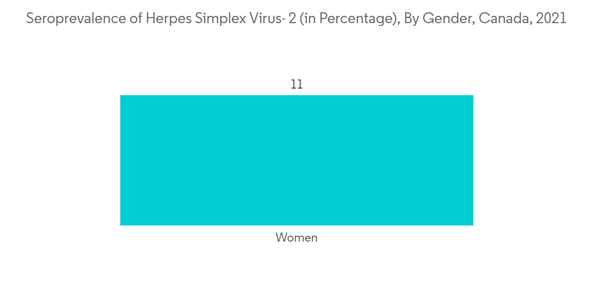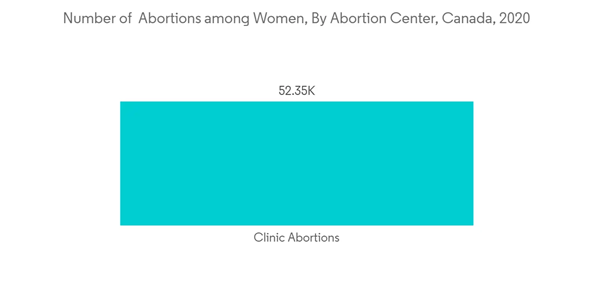Due to COVID-19-related lockdowns, access to contraception was disrupted, leading to an increase in unsafe abortions, miscarriages, pregnancy problems, HIV transmission, and other STDs, as well as an increase in PTSD, despair, suicide, and intimate partner violence. These implications disproportionately affected marginalized communities in the United States and emerging nations, widening both domestic and global healthcare inequities. As per an NCBI article published in October 2020, the COVID-19 crisis is expected to result in 7 million unwanted births for more than 47 million women, according to research by the UN agency for sexual and reproductive health (UNFPA). According to another article published in July 2022, contraceptives are limited and expensive, particularly for people living in rural and underprivileged communities. In Canada, between 30-40% of pregnancies are unplanned. Thus, the increase in unwanted and unplanned pregnancies in the country is expected to increase the complications related to childbirth in women. That is expected to drive awareness of the usage of contraceptive devices, boosting the growth of the market.
According to the Government of Canada, data published in February 2022 showed that sexually transmitted infections (STI) were a significant and ever-increasing public health concern in the country. STIs are among the most common communicable infections affecting the health and lives of people worldwide. According to the Public Health Agency of Canada (PHAC) and the Canadian AIDS Treatment Information Exchange, data published in 2022 showed that the three reportable bacterial STIs in Canada are chlamydia, gonorrhea, and infectious syphilis. Chlamydia is the most common, followed by gonorrhea and syphilis. To avoid such diseases and their transmission, contraceptive devices are recommended, which is expected to drive market growth in the country.
A rise in the number of gynecologists favoring these contraceptive methods for birth control is anticipated to drive industry growth in the coming years. The increased use of safe and effective oral tablets increased awareness of modern contraceptives, and health issues associated with teen pregnancies contribute to the market's growth. Rising awareness in the Canadian population regarding contraception methods, investments by key players to develop innovative devices, and favorable government initiatives to improve access to products are the major factors accelerating the growth. The expansion of the Canadian market for testing for STIs is expected to be driven by an increase in STD cases among the population. Rising government initiatives to introduce new diagnostic kits and tests are expected to fuel market expansion. According to PHAC reports, syphilis cases increased to 9,126 in 2020. Thus, the increasing number of STIs and other infections promotes the usage of contraceptive devices and increases their demand, thereby expecting increased market growth.
However, the side effects of contraceptive devices have been restraining the market's growth.
Canada Contraceptive Devices Market Trends
Condoms are Expected to Dominate the Canada Contraceptive Devices Market
A condom is a sheath-shaped barrier device used during sexual intercourse to reduce the probability of pregnancy or an STI. There are both male and female condoms. Women whose partners use male condoms experience a 2% per-year pregnancy rate. Their use greatly decreases the risk of gonorrhea, chlamydia, trichomoniasis, hepatitis B, and HIV/AIDS. They also protect against genital herpes, human papillomavirus (HPV), and syphilis to a lesser extent.In Canada, the use of condoms has significantly increased among adolescents due to easy availability and convenience. According to the survey conducted and published in NCBI in February 2020, about 30% of the studied adult population claimed to have used a condom whenever they had intercourse. Thus, effective protection from STIs and high demand from the young population to enhance their sexual experience are expected to aid the demand for the product.
Also, increasing product launches are expected to contribute to the growth of the market during the forecast period. In May 2022, Dubbed Jems launched Vegan Condoms for safer intercourse, renouncing toxicity in all forms.
Thus, the above-mentioned factors are expected to drive the growth of the segment during the forecast period.
Vaginal Ring is Expected to Hold a Significant Share Over the Forecast Period
The vaginal ring is a small, flexible ring worn inside the vagina for birth hormones. It releases the hormones estrogen and progestin through the vaginal lining to prevent pregnancy. It is worn for three weeks and then removed for one week.The increasing rate of unwanted pregnancies, rising awareness among the Canadian population, and increasing product launches by various market players are expected to contribute to the growth of the market.
For instance, the Impactethics article published in June 2021 mentioned that one in five Canadian women had an unintended pregnancy; over 61% of Canadian women have unintended pregnancies. Such a high incidence rate of untended pregnancies among Canadian women is expected to drive the demand for vaginal rings, thereby fueling the growth of the segment.
Increasing product launches are also expected to contribute to the growth of the market. For instance, in February 2022, Mithra and Searchlight Pharma commercially launched Mithra's vaginal contraceptive ring, Myring, under the brand name Haloette in Canada. Haloette is an affordable option for women; it was approved by Health Canada in September 2021.
Thus, the prevalence of unintended pregnancies and frequent product launches are expected to contribute to the growth of the segment.
Canada Contraceptive Devices Industry Overview
The market is moderately competitive in nature. The competitive landscape includes an analysis of a few international and local companies that are well-known and hold significant market shares. Some of the key industry contributors are AbbVie Inc. (Allergan), Bayer Healthcare, Cooper Surgical Inc., and Mylan Laboratories, among others.Additional Benefits:
- The market estimate (ME) sheet in Excel format
- 3 months of analyst support
This product will be delivered within 2 business days.
Table of Contents
Companies Mentioned (Partial List)
A selection of companies mentioned in this report includes, but is not limited to:
- AbbVie Inc. (Allergan)
- Bayer Healthcare
- Cooper Surgical Inc.
- Mylan Laboratories
- Pfizer Inc.
- Teva Pharmaceutical Industries Ltd
- DKT International
- Pregna International Limited
- Reckitt Benckiser










